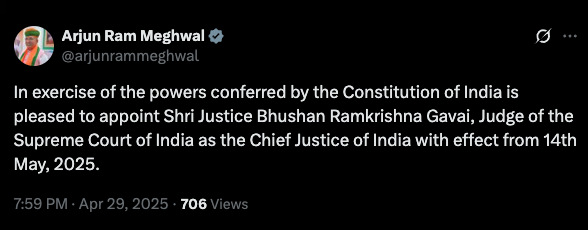By The Sampadak Express
President Droupadi Murmu has appointed Justice Bhushan Ramkrishna Gavai as the 52nd Chief Justice of India (CJI). He will assume office on May 14, 2025, succeeding current CJI Sanjiv Khanna, who retires on May 13.
The announcement was made by Union Law Minister Arjun Ram Meghwal via social media. “In exercise of the powers conferred by the Constitution of India, the President is pleased to appoint Justice B.R. Gavai, Judge of the Supreme Court, as the Chief Justice of India with effect from May 14, 2025,” Meghwal posted on X.

Justice Gavai will serve a brief tenure of six months, as he is set to retire in November 2025.
Background and Career
Born on November 24, 1960, in Amravati, Maharashtra, Justice Gavai is the son of late R.S. Gavai, a former Governor of Bihar and Kerala and a respected social activist.
Justice Gavai began his judicial career as an Additional Judge of the Bombay High Court on November 14, 2003, and became a Permanent Judge on November 12, 2005. During his tenure of over 15 years, he served in multiple benches including Mumbai, Nagpur, Aurangabad, and Panaji. He was elevated to the Supreme Court on May 24, 2019.
Notably, he will be the second CJI from a Scheduled Caste background, following Justice K.G. Balakrishnan.
Key Judgments
Justice Gavai has been part of several significant Supreme Court verdicts:
Demonetisation Case: He authored the majority judgment upholding the 2016 demonetisation decision, endorsing the Union government’s authority and confirming that the move passed the constitutional ‘test of proportionality’.
Property Demolition Ruling: He strongly held that demolishing the homes of accused persons without following legal procedures is unconstitutional, stating that the executive cannot bypass the judiciary.
Electoral Bonds Verdict: Justice Gavai was also part of the bench that evaluated the legality of the Electoral Bond Scheme, a contentious issue related to political funding transparency.
Justice Gavai’s appointment marks a historic moment and brings attention to social inclusion at the highest level of the judiciary.



